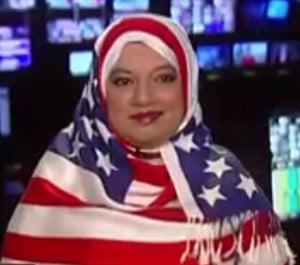One of the most common questions that the media, and maybe even non-Muslim in everyday life, have for women who wear hijab is “how do you do [insert whatever said activity here] in hijab?” It is probably also a question that Bilqis Abdul-Qaadir gets often, since she is a star high school basketball player in Massachusetts. It’s a question that you would expect to be answered fairly, quickly, and straightforwardly.

However, Bilquis’ hijab was the focus for a recent Sports Illustrated profile. The title of the piece “Enlightening the Clothes-Minded” was at least a warning about what was to come. The whole piece serves to “otherize” Bilqis and hijabis in general, rather than simply being a general sports article covering a high school basketball star. In the second sentence of the article, we’re made to wonder how “…Bilqis Abdul-Qaadir is able to exploit the limited daylight she gets and average 42 points a game.” I wondered if Selena Roberts was making a reference to the recent slew of articles warning that hijab prevents women from getting enough sunlight. That said, I wonder why it was necessary to mention it at all. How does Roberts know that Abdul-Qaadir gets limited daylight? Is the daylight she gets more limited than that of her teammates?

From, then Roberts focuses on how Abdul-Qaadir could score 3,000 points over her four year high school career in hijab. Roberts could’ve pulled aside any hijabi on the street for the answer and simply wrote an article on Abdul-Qaadir’s awesome basketball skills. Unfortunately, she didn’t. Seriously, it is not that hard to play basketball in hijab. It’s amazing to Roberts that Abdul-Qaadir could break Rebecca Lobo’s record in a full sleeve shirt with a headscarf wrapped around her head. Bilqis mentions that she wears Under Armour gear on the court to help her move better, that she had to wear hijab once she reached puberty, and that she does get the occasion stupid comment like “terrorist” while playing basketball.
These points could’ve been covered in a paragraph at the most, but Roberts drags them out for the entire article. Even the last sentence is focused on hijab rather than Bilqis: “That’s Bilqis, in the hijab. It’s the blur you see on her head fake to the basket. How does she do it? That’s how.” So hijab makes Bilquis a blur?
The most annoying part of the entire piece though is when Bilqis is asked a completely unrelated question about an Israeli tennis player who was denied a visa to a tournament in Dubai. “It didn’t go unnoticed to Bilqis last month when Shahar Peer, a Jewish tennis player from Israel, was denied a visa at the last minute for a WTA tournament in Dubai. In an instant that city, which is so Westernized it can seem like a gilded Disney of the desert, took a major step backward by entwining religion and sports.” While a lot of people, including Bilqis, may feel for Shahar Peer, it has absolutely nothing to do with whether people accept Bilqis as a top athlete. Just because Bilqis is a Muslimah doesn’t mean that she has to speak about an unrelated incident that happened to a Jewish tennis player across the globe.
Additionally, the comment on Dubai itself was perplexing and disjointed. Besides the fact that it was irrelevant, it was racist as well, associating Westernization with acceptance and enlightenment while once again associating an Arab society with being backward. Not to mention that many nations, including a lot of Western ones, have entwined politics and sports in the past.
As Abdul-Qaadir moves on to college basketball, I hope that her basketball skills and not her religion or her dress are the focus of sports articles written on her. While articles like these seem like compliments at first glance, they ultimately serve to once more otherize hijabis.











